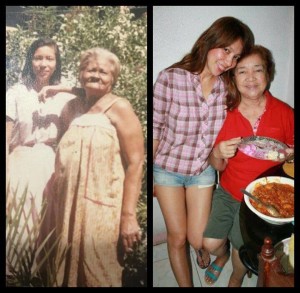Mom’s challenge—raising a Filipino child Stateside
After playing Chinese garter on the dusty playground, Adelleson wiped her perspiring face. She needed to look clean before Mamay, her nanny, fetched her and her sisters in school.
“Mamay was my second mother. My mom was a Department of Education official so she worked mostly in Manila,” recalls Maria Fe Adelleson Dantis, 45, now a Salt Lake City, Utah resident.
Adelleson looks back on her childhood in the Philippines as a reference point now that she is raising her own daughter, Billie, who is now 14 years old. Although she has her own style of mothering, she wants her daughter to grow up embracing Filipino values, even in the United States.
Coming to America
Despite being a successful entrepreneur and a nurse by profession in Manila, Adelleson sought greener pastures in the United States. In 2014 Adelleson’s immigrant visa was finally approved after waiting for eight years. She was petitioned by her company.
The application took a long time because of retrogression. It happens when more people are applying for a visa than the allowed limit set by the United States immigration. The long wait did not dampen her hopes; instead, she took it as an opportunity to acquire more skills, like baking.
“There are more job opportunities in America. Besides, I wanted to start life anew with my daughter,” she says.
Adelleson and Billie stayed with her youngest sister who is already an American citizen.
“I started my job a week after we arrived. But getting a place of our own came later. We stayed with my sister and her family for a year. My brother-in-law let me use his jeep,” Adelleson says.
Working as a dialysis nurse in a clinic in Salt Lake City, Adelleson had an easy transition. Her colleagues are warm, welcoming and accommodating.
‘It takes a village’
While the job does not pose too many challenges, motherhood is another story, especially raising a young woman who has yet to establish herself as a Filipino American.
Adelleson works full time. But she works more during days off; but this is the work she enjoys most. Day-offs are for mother-daughter bonding.
“I drive her to and from school. I get to prepare her breakfast. Off days are also reserved for piano and violin lessons, dental and medical consults. We do groceries, movies together. Whenever I can, I take vacation leave so we can travel and do our bucket-lists,” she says.
In their home province of Occidental Mindoro, a child is not only raised by a family, but also by the community. Growing up in a large family with four sisters and a brother, Adelleson misses the support of her sisters and relatives in raising her daughter.
“It was difficult, although I am a hands-on mom back then. There was always support. We had nannies. Here, I have to do it on my own,” shares Adelleson.
Motherhood challenges
Motherhood is the ultimate job where there is no resignation. Adelleson recalls how she and her siblings were brought up by their mother, Sonia, and Mamay, their nanny, whom she fondly calls her second mother.
Adelleson recalls that she was brought up in a time and place where every action had a consequence.
“Naughtiness is dealt with by pinching, a slap on the bum and the dreaded belt — the Pinoy way of discipline. There could be none of that here, or else Family Services and, heaven forbid, the police will step in,” she laughs.
Love of study was deeply ingrained in the Dantis siblings. It was not only because their mother was an educator. Their parents taught them the value of education. Adelleson recalls having house-help was not an excuse to ignore the basics of housekeeping.
“At school, we must be always on time. We must also come home on time at 5 p.m. At a young age, I know how to do the laundry and to cook,” says Adelleson.
Since Billie spent her formative years in the Philippines, she retains the Filipino values she learned as child, Adelleson believes.
“The main challenge (in raising a child in America) is how to retain the Filipino values — saying po and opo, kissing the hands of elders (mano), not talking back, and most of all, speaking the vernacular,” Adelleson says.
Keeping values and traditions alive
Being family oriented, love for family, respect for elders, pakikipagkapwa tao (respect for others) and resiliency are among the Filipino values Adelleson wants for Billie.
“We have the innate ability to find humor, smile and be happy even in the worst calamities; being hardworking, flexible and industrious, Filipinos can do anything. We can work on anything,” she says.
However, too much hospitality is a negative Filipino trait that she does not want to impart to Billie because Filipinos “tend to go overboard” when visitors, especially foreigners, visit.
Adelleson says that the presence of relatives and the Filipino community helps in the continuity of the Filipino traditions.
“We both get to practice our culture and keep it alive for the next generation,” she enthuses.
“Never forget who we are and where we came from,” Adelleson emphasizes. “Always remind our kids that they may be living in this country, but their heart, soul and values will always be Filipino.”




